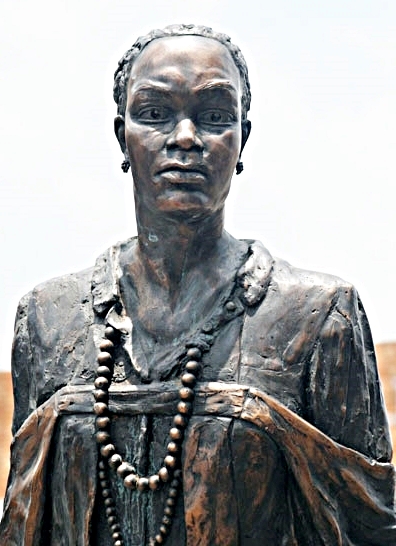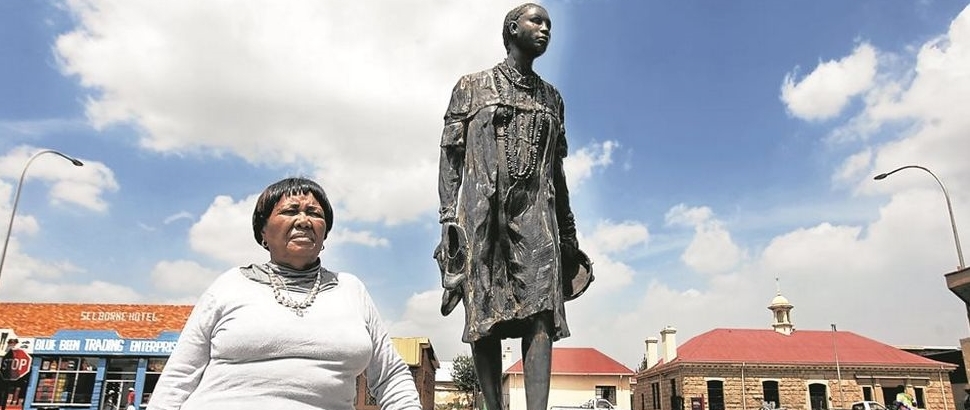The AfricaPaper | South Africa

Johannesburg, South Africa – Thembi Nkadimeng, the sister of disappeared anti-apartheid activist Nokuthula Simelane today filed an application before the Pretoria High Court compelling the National Director of Public Prosecutions and the Minister of Justice to refer the kidnapping, torture, disappearance and murder of Simelane to a formal inquest. This case is aimed at bringing closure to the 32 year old abduction, torture and enforced disappearance of Nokuthula Simelane.
Tortured and Disappeared
In 1983, Nokuthula Simelane was abducted, tortured and forcibly disappeared by members of the Security Branch of the former South African Police. She was a twenty-three year old university graduate and acted as a courier for Umkhonto we Sizwe, the armed wing of the African National Congress, moving between Swaziland and South Africa. Her remains have never been found. The family has been denied the right to bury their daughter with the dignity she deserves.
Nkadimeng, who is currently the mayor of Polokwane, said that there has been no rest for her family since her sister’s disappearance over 30 years ago, “We know she suffered terribly but we don’t know how she died, and where her body is today. We have spent three decades looking for Nokuthula. Now we want justice and closure.”
Truth and Reconciliation
In 1996, a police docket was opened and in 2001 the Amnesty Committee of the Truth and Reconciliation Commission (TRC) granted some of the perpetrators amnesty for Nokuthula’s abduction, including certain police officers who the Committee found had lied about the brutal torture. This was notwithstanding the full disclosure requirement laid down in the TRC law. None of the perpetrators applied for amnesty for her murder.
Notwithstanding repeated pleas by the family to the authorities, some 32 years after the disappearance of Nokuthula no decision has been taken to refer her case to an inquest, neither has a decision been made whether to prosecute the perpetrators who did not apply for amnesty for murder or kidnapping.
Delay and Inaction
The untenable delay and inaction from the South African authorities constitutes a violation of the family’s rights to human dignity and equality, and is inconsistent with the rights to life, freedom and security of person. It also stands as a deep affront to the rule of law in South Africa.
“Nokuthula’s case brings to the fore the need to adequately address the legacy and crimes of apartheid” said Southern Africa Litigation Center’s Director Kaajal Ramjathan-Keogh, “gross violations of human rights should not and cannot be swept under the rug.”
The case discloses evidence of political interference by the government into the work of the National Prosecution Authority which effectively barred the investigation of cases recommended for prosecution by the TRC.
Nokuthula’s family is assisted by the Southern Africa Litigation Centre represented by Advocates Muzi Sikhakhane and Howard Varney, instructed by the Legal Resources Centre.
Example of Hundreds

Nokuthula’s case is but one example of hundreds of other cases that have been similarly neglected. The South African Coalition for Transitional Justice (SACTJ) calls on the National Prosecuting Authority (NPA) to honor its obligation to prosecute those cases for which perpetrators have been denied amnesty or failed to apply for amnesty.
Other examples where impunity still prevails includes the brutal murders of the Cradock Four and the PEBCO Three. Although Nokuthula’s case is not a class action on behalf of all victims of outstanding TRC cases, this case is representative of all such incidents where victims remain without closure for crimes that happened decades ago.
Abandoned by Authorities
These legal proceedings explain for the first time why Nokuthula’s case, and the other TRC cases, have been abandoned by the authorities. This is due to the gross political interference in the constitutionally mandated work of the NPA. Such interference constitutes a serious violation of the rule of the law. The Coalition deplores this interference and calls on the government to respect and uphold the independence of the NPA.
This case is also indicative of the almost total disregard by the South African government for the recommendations made by the TRC. To date, very few perpetrators of apartheid-era crimes have been held accountable before the courts. This is despite the TRC handing over approximately 500 missing person cases and 300 other cases for possible prosecution to the NPA, following the completion of the Amnesty Committee’s work. The delays in prosecutions deny victims an important form of reparation – accountability. Another key element is the absence of a victim-centred financial and socio-economic reparations program .
Post-TRC Prosecutions
The lack of adequate reparations and the protracted delays in pursuing post-TRC prosecutions, seriously undermine the TRC’s ground-breaking legacy of reconciliation alongside a conditional amnesty. Indeed, such failures have promoted an ongoing cycle of impunity and effectively introduced a de facto blanket amnesty for all crimes of the past. The failure to pursue cases, such as the torture and disappearance of Nokuthula Simelane, represents a deep betrayal of those who struggled and died to free South Africa. The prospect of justice for Nokuthula Simelane and her family represents an important step towards remedying this situation.
Background to the SACTJ
The SACTJ is an umbrella body of organizations working to advance the rights of victims of past conflicts and to hold the South African government accountable to its obligations. The member organisations are committed to helping secure the rights of victims of apartheid-era human rights violations and raising awareness about these rights. These organisations are Centre for the Study of Violence and Reconciliation (CSVR), Human Rights Media Centre (HRMC), Institute for Justice and Reconciliation (IJR), Khulumani Support Group (KSG), South African History Archive (SAHA) and Trauma Centre for the Survivors of Violence and Torture (TCSVT). The International Center for Transitional Justice (ICTJ) is a friend of the SACTJ. TAP
The AfricaPaper: Refik Hodzic is Director of Communications at the International Center for Transitional Justice (ICTJ) headquartered in New York.
PHOTO: Statue of anti-apartheid activist Nokuthula Simelane, who was tortured and disappeared in 1983 by Security Police, in her home town of Bethal, South Africa. (South Africa House of Memory)









































